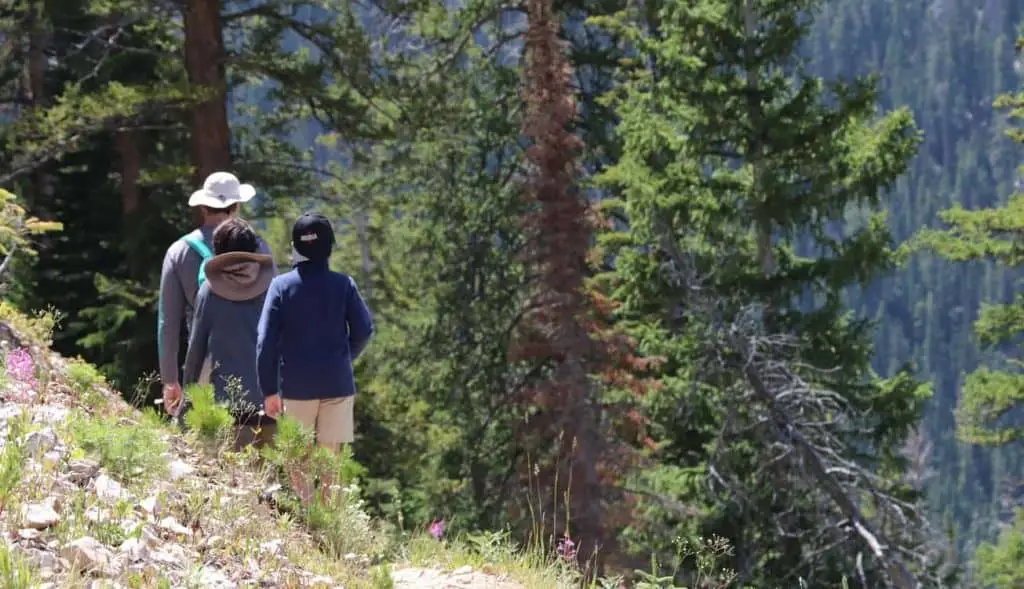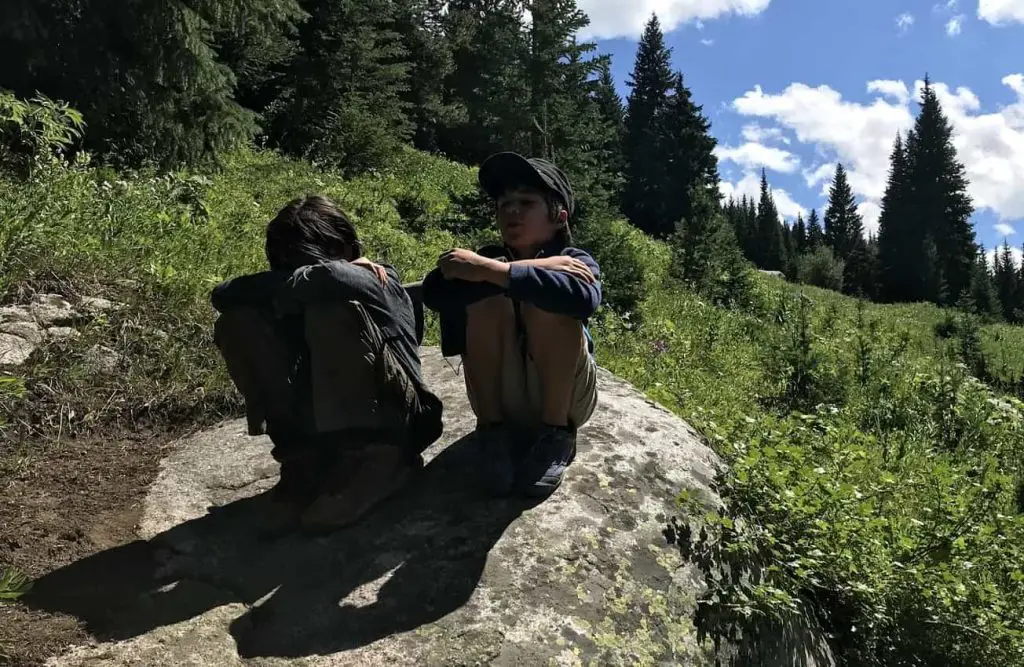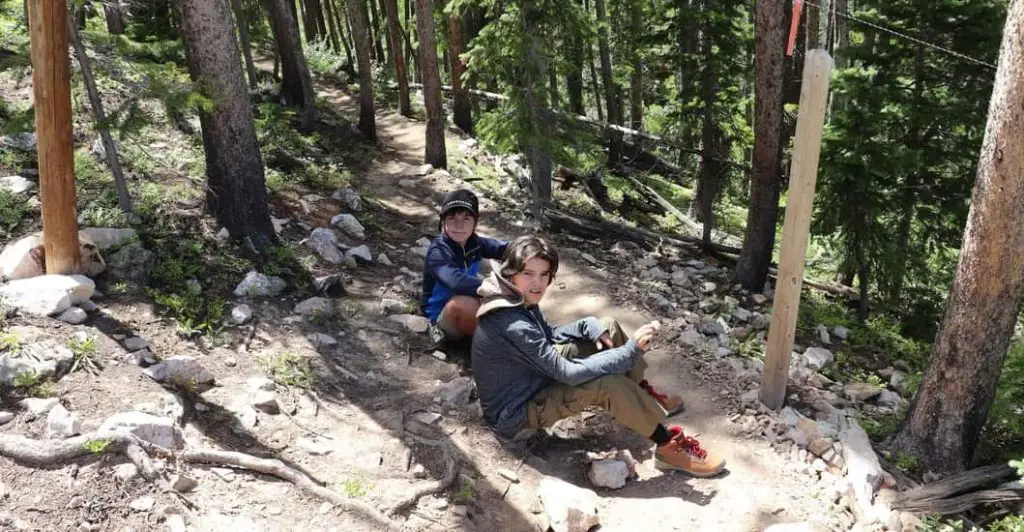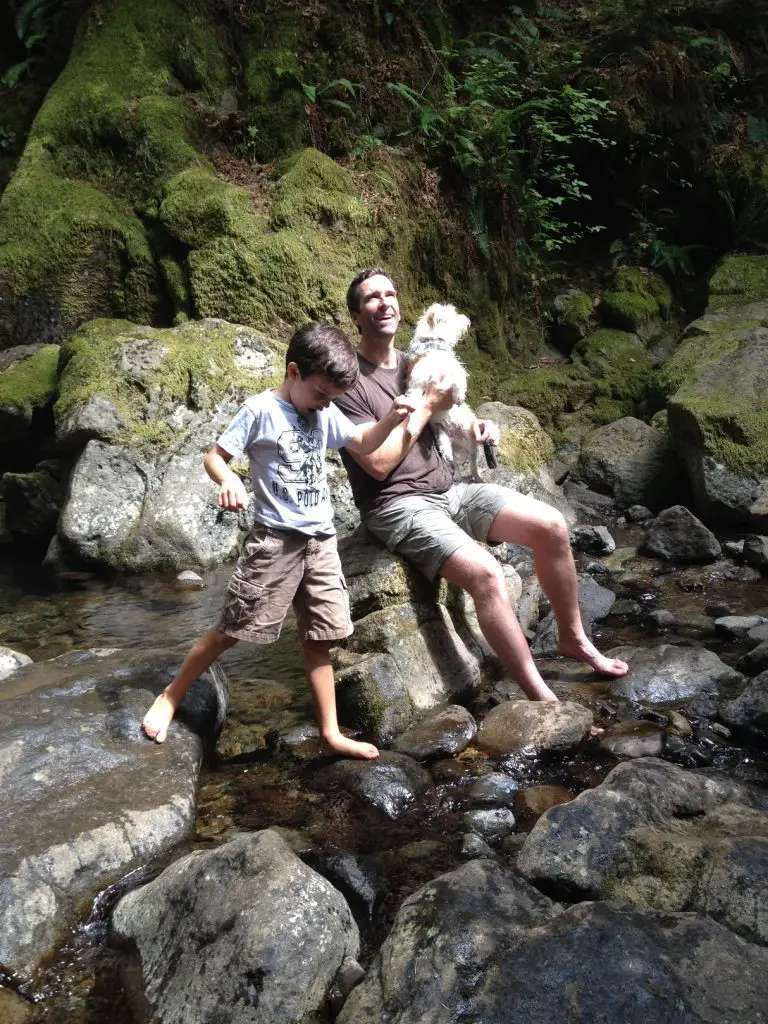Hiking is a great way to spend time together as a family. Bringing your children along for an afternoon hike can be a real antidote to video games, social media, and boredom.
Convincing your children to come on the hike, though, can be a challenge. What’s more, once they are on the hike, it can be hard to keep them motivated to keep going.
If your children are apathetic about hiking or are deadset against it, here are fourteen ways to motivate your children to get excited about the hike.
1. Plan the Hike Together
As parents, we often fail to include our children in the most important part of any activity – the planning. Adults and children alike prefer to understand what they are being asked to do.
As a supervisor for many years, I know how important it is to get buy-in from my employees before moving forward with a project. If your team does not believe in the project or the hike in this case, then you are dead in the water before you even lace up those boots.
Talk to your children about the hike. Show them maps of the route. Ask for their opinions about which hike to go on. Ask them which time of the day they prefer to hike. And, most importantly, be sincere about wanting their input.
You can steer their thoughts and opinions in the direction you feel is best, but the hike’s final planning needs to be achieved in concert with your children. Here are some points to iron out for your hike.
- When will the hike take place?
- Which hike will you tackle?
- How long should you hike?
- What will you bring on the hike?
- What will you eat on the hike?
- Will your pet come on the hike?
- Should you invite some friends on the hike?
Hopefully, by including your children in planning the hike, they will feel some ownership and be more motivated to go on the hike.

2. Set Measurable Goals For the Hike
Another way to motivate your children on the hike is to identify and agree on some hike goals. This is also called ‘chunking.’ If you break down the three-hour hike into chunks or a series of events, your children will feel progress and success without focusing too much on the fact that they will be walking for three hours.
Create a loose timeline for your route with achievements along the way. Identify some major features of the hike and some events that will need to occur as you hike. For example, the goals for your hike can be as follows.
- 00:20 Hiked one mile – rest for water and snacks.
- 00:45 Arrive at the bridge – play time at the river.
- 1:30 Halfway point of hike – lunch.
- 2:15 Return to the bridge – rest for water and snacks.
- 3:00 Finish hike.
By linking your arrival at certain landmarks along the route to events, such as resting or eating lunch, you will carry the weary hikers on to the next event. Lunch is just at the top of that ridge. Or, when you arrive at the bridge, we will play by the river.
This technique will help tie the distance covered to some reward and motivate young hikers to keep going.
3. Celebrate the Attainment of your Goals Along the Hike
Prepare something in advance to do with your children as you achieve the goals you have set along the route. This can be as simple as a special piece of candy. It can be symbolic such as giving them more access to their favorite video game upon returning home.
By giving the gift, the children need to understand that they earned it because they accomplished that portion of the hike. The gift or gesture should be directly tied to their accomplishment and effort.
As you progress along the hike, this unknown benefit for completing the next stage will motivate your children to keep going. The anticipation of a reward is a huge motivator in children or adults.
Another twist to this is to give the children their reward in advance of completing the next goal with the warning that if they don’t finish, they will have to give the reward back. They will lose it.
People tend to be more motivated by the risk of losing a reward than by attaining one. Both are good motivators, though.
Have fun with this one but make sure your children are truly motivated and engaged with this. Older children might be harder to motivate using this technique.
4. Add Competition to the Hike
Children, like adults, are competitive by nature. Create a game or activity that the children can engage in while hiking. A large part of getting unmotivated children to hike is to change their mindset.
A game or activity will remove the thought of a three-hour hike from the minds of your children. Distraction is the key.
Use the nature around you to create a game. Easy games to play with children while hiking are those that identify flora and fauna in the environment.
- Eye Spy: There are many ways to play this game. One person states that they see an object and say what color it is. The others have to guess which object it is.
- Twenty Questions: One player thinks of an object in the environment. The other players take turns asking “yes” or “no” questions until they figure out what the object is. You can also do this with animals instead of objects in your environment.
- Riddles: Children love riddles. You can prepare a list of riddles based on nature that you read aloud to the children. The child with the most right answers wins.
- Points for meeting goals: Can you have a points system for your goals along the hike. This simple game of accruing points for arriving at destinations along the hike can keep little feet move forward.

5. Give Lots of Encouragement
As adults, and especially as parents, we have learned to deny our own instincts and desires. We know how to operate on zero sleep or forego the last muffin because someone else wants it.
Children are not as self-aware. If their body tells them to stop because it feels tired, then they will always agree.
Provide tons of encouragement to your children along the hike. Remind them of the rewards awaiting them for their accomplishments along the way. Keep them focused on their successes. Be a cheerleader.
If you have already given them a surprise reward for meeting a goal, then remind them that more rewards are just around the corner. Or remind them that they will lose their reward if they don’t arrive at the next goal.
Tell your children that you are so proud of them and that you know they have the strength and stamina to keep going.
6. Combine Your Children’s Interests with the Hike
Children can become very fixated on one thing. If you have children, you know what I mean. This may be a children’s TV show, a video game, or social media depending upon their age.
There are so many possibilities here for connecting your children’s interests in a meaningful way to the hike. Get creative.
With my ten-year-old, I would talk about “what-if” scenarios along the hike. If a zombie horde emerged from the forest on our left, what would you do? If you had a jet-pack, what would you do?
You can ask questions about the environment that only have meaning in the context of your child’s interest. How many woodblocks do you think this tree would give if we played Minecraft right now? Where would you build your house if you were playing Minecraft?
Stimulate your children’s natural creativity and make-believe.
For older children with phones and social media, you can have them chronicle their experience on the hike. If you have multiple children with social media, you can turn this into a competition on the number of views or likes by a given time or date.
Social media is a double-edged sword obviously, but if you striking out with other strategies to motivate your teen-ager to hike, then a social media competition might get them out the door and on the hike.
7. Tune Into your Children’s Discoveries on the Hike
If your children point out anything along the hike, whether mundane or monumental, then be sure to stop and admire it. Participate in their discovery and start a conversation about that discovery.
You may be seeing a pattern in this post of the amplification of motivating factors for the hike and minimization of any attitudes that may cause your children to lose interest in hiking.
For motivation, it is important to recognize another person’s contribution to the group. If your children make any positive utterance that recognizes the novelty of their experience along the trail, then you must stop and make a big deal about that. You cannot ignore their discovery.
If you ignore their statement, there is a real chance that your child will mentally check out and lose motivation for the hike.
8. Communicate Positivity on the Hike
Don’t be negative. One surefire way to squelch your children’s enthusiasm is to make negative comments about anything while you are hiking. Children feed off our energy, and if you are exuding positivity, you will directly contribute to your children’s motivation levels throughout the hike.
Being positive is about seeing the glass half full; it is not about sugarcoating reality. If the weather takes a turn for the worse and you are caught in a downpour, you cannot say that the weather is wonderful. What you can say is that you are thankful it is not snowing.
By focusing on the positive you will steer the groups’ mood during the hike toward the upside of situations and away from the downside.
For children, the big issue on a hike will be the distance and the time remaining. When they ask you how much farther they have to walk, remind them of what awaits at the next goal. Avoid telling them they have twenty more minutes of walking.

9. Take Advantage of Peer Pressure to Get Your Children to Hike
Inviting your children’s friends on the hike is an effective way to motivate them to hike and keep going. When they become tired or lack motivation, seeing a friend soldiering on will most likely cause your children to reassess how tired they are and decide to keep going.
Having other children on the hike is also a distraction from the physical stress or tedium of extended walking that your children may experience.
When your children hike with their friends, they will naturally turn the hike into play, which will draw their attention away from hiking aspects that they might otherwise find difficult.
10. Give Your Children Tasks for the Hike
Adults and children alike will be more motivated on a hike if they feel some sense of responsibility for the hike’s success. Having a job to do will also keep your children focused on completing their tasks instead of any discomfort from the hike.
There are so many possibilities. What is most important is that the task is meaningful. Carry stuff is probably not going to be a big motivator for children, but each child is different. Younger children often love backpacks.
Here are some tasks you can assign children on a hike to keep them motivated.
- Photographer – Give this child the camera or smartphone and task them with documenting the whole hike from start to finish.
- Navigator – Give a map to this child and ask them occasionally to tell you where the group is along the hiking route.
- Timekeeper – This child can time the hike to track how many minutes you have been hiking.
- Zoologist – You can ask one child to spot birds and other animals for the rest of the group. Suppose you have binoculars all the better.
- Cook – One child can be tasked with distributing the snacks for lunch, and the rest breaks.
11. Maximize Your Children’s Comfort on the Hike
Nothing drains motivation on a hike, like being wet and cold. I would advise against hiking with children in inclement weather in general. Weather forecasts are notoriously bad for predicting mountain weather.
If you relied on the local forecast near your home, you might find that you find vastly different conditions on the trail.
Search for hourly weather forecasts for the specific area you plan to hike in, not the local international airport.
Bring some extra clothing for bad weather.
Children should have comfortable clothing and shoes to hike in. You don’t need to buy hiking specific gear for a day hike with children.
Apply sunscreen and wear hats. Three or four hours of direct sunlight at higher elevations can cause not only discomfort but sunburns. These conditions can zap motivation and ruin your best-laid plans to complete the hike.
12. Bring Enough Food and Water
My wife and I brought our 11-year old and his friend on a six-hour day hike in the White River National Forest in July. We ran out of the water after about five hours, and the boys were zapped of all energy. Getting them back to the Beaver Creek Resort was not easy.
Hydration while hiking is critical to comfort and motivation levels. Check out my guide here for how much water to bring on a hike. Encourage children to drink water continuously along the hike.
Monitor your children’s energy levels on the hike and stop to eat a snack as needed. Sugars and carbohydrates will boost their energy and motivation.
13. Shorten the Hike
As a dad, it is hard not to feel like turning back early is giving up. If the group’s mood is irrecoverably low and none of the tips in this post are working anymore, then it might be time to change your plans.
Hiking with children should be fun. Forcing them to endure more hours of something that is clearly a negative experience will only reinforce their lack of motivation to agree to future hikes.
Deciding to stop short of the majestic waterfall at the end of the path can be difficult. You know your children well enough to see when no amount of cajoling will get them to keep moving forward. Most importantly, stay positive and encourage them even if you are sorely disappointed about turning back early.

14. Bring Your Dog on the Hike
Depending on your dog’s size and temperament, bringing the family pet can really bolster your children’s motivation to keep hiking. This one is last on the list because it is really dependent upon the relationship your children have with the dog.
A large breed that spends all of its time in the backyard not interacting with the children may not provide any motivational support to the young hikers. Even worse, now you have another hiker that requires extra attention and energy.
The family pet on the hike steers your children’s focus away from their own needs and onto those of the pet. Dogs are often very enthusiastic on hikes, and this energy will carry over to your children as well.
As with any hiking tips, use what you can and discard everything else. Be aware of your own limitations and use good judgment.
